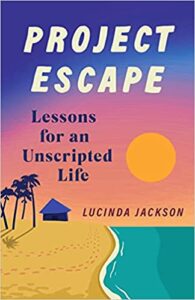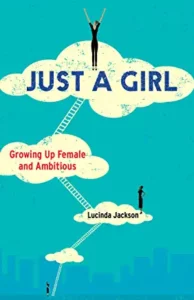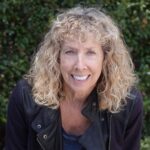Author Interview—Lucinda Jackson (Palau)
Interviewed by Heidi Eliason
Lucinda Jackson–Palau 2016
Lucinda Jackson is the author of two memoirs: Just a Girl: Growing Up Female and Ambitious, about her struggles to succeed in the male-dominated work world, and Project Escape: Lessons for an Unscripted Life, an exploration of freedom after leaving a structured career. Jackson is a PhD scientist and global corporate executive who features on podcasts and radio and has published articles, book chapters, magazine columns, and patents. She is the founder of LJ Ventures, where she speaks and consults on energy, the environment, and empowering women in the workplace and in our Next Act. Connect with Jackson or find her books at: www.lucindajackson.com.
Who or what inspires you to write?
I get inspired by having something to say. I feel this burning concept or thought inside me and I just have to get it out! It is this need to express myself, to make sense of something, or to tell others about something important that inspires me to write.
To make sense of something—I love that. I’ve often worked my way through thoughts or experiences by writing about them. What is the best thing that has happened because of your writing?
The best thing that’s happened because of writing is the creative, thoughtful people I’ve met and the privilege I have to hang around with them. I’m friends with other writers now and it’s a blast! When I sit down next to an author and ask, “What are you writing about?” I immediately get hit with an incredible and entertaining story. It’s so interesting and energizing for me.
There is an amazing community of interesting and talented writers out there. It’s incredibly enriching getting to know them and hearing about their successes and struggles. What is the most difficult thing you have experienced about writing or publishing?
 I had no idea how much work it actually took to write and publish a book. It involves hours and hours of dedicated, focused time. It’s not for the faint of heart! You have to be very disciplined and be ready to plug on even if you don’t really feel like it. It’s not all inspiration and fun story-telling—it’s sitting down at your computer and agonizing over one word for an hour. And then when I completed the writing stage, I reached the new hurdle of finding a publisher. Next came marketing the book—a whole new effort and full-time career. I’ve developed an enormous appreciation for authors.
I had no idea how much work it actually took to write and publish a book. It involves hours and hours of dedicated, focused time. It’s not for the faint of heart! You have to be very disciplined and be ready to plug on even if you don’t really feel like it. It’s not all inspiration and fun story-telling—it’s sitting down at your computer and agonizing over one word for an hour. And then when I completed the writing stage, I reached the new hurdle of finding a publisher. Next came marketing the book—a whole new effort and full-time career. I’ve developed an enormous appreciation for authors.
Writing and publishing a book definitely takes perseverance and hard work. And yes, writers can agonize over a single word! I’ve done it myself. What didn’t you do during your writing or publishing journey that you wish you had?
I didn’t adequately teach myself about sensitivity reading, also known as cultural accuracy reading—which involves vetting a manuscript for biases, stereotypes, and other factors that may be inadvertently harmful to a person or group. I consider myself a non-judgmental, inclusive individual so I didn’t think much about it, as my intent is never to insult or put down others. In fact, I pride myself for my diversity, equity, and inclusion skills. However, insensitivity can creep in without you even knowing it. For example, I used the term “cake walk” in one sentence, not realizing it was a dance done by slaves in the American South dressed in fancy clothes for their owners’ amusement. I changed it to “child’s play.” Thankfully my diverse and knowledgeable beta readers pointed some of these missteps out to me. It was embarrassing! What I wish I’d done is been aware that cultural mistakes can happen and specifically asked my beta readers to include a sensitivity read as part of their review. It would have better shown my knowledge and willingness to accept any criticism and guidance towards improvement in that area—and my appreciation for their help pointing it out.
That is such good advice to ask beta readers to do a sensitivity read. It’s a very important step before publication. Do you have a publisher and/or agent, or are you an indie (self-published) or hybrid author?
I did a lot of research on how to get your book out into the world. I researched about and sent book proposals to traditional and indie publishers. I pitched agents. I also studied self-publishing and took a few courses to learn the techniques. I knew I didn’t want to self-publish because I didn’t feel competent to do all the work that’s required. I felt insignificant to most agents, so I didn’t pursue that avenue very hard. I kept thinking there’s got to be something that’s a middle ground between a publisher and self-publishing and then I found out about hybrid publishers. I researched several of them, sent in book proposals, and was accepted by She Writes Press. They have beautiful covers, do all the administrative and publishing work for you, specialize in memoir (my genre), and are a woman-owned, woman-run company. She Write Press fit my needs perfectly.
I’ve heard good things about She Writes Press from a number of authors. Can you tell us why you like writing memoirs?
 I write memoir because I’ve had an active life and feel others might benefit from what I’ve learned. I’ve also always felt that memoir is fascinating because it’s true. I rarely read fiction because I’m more interested in actual facts, history, and experiences that come from people’s real-life stories.
I write memoir because I’ve had an active life and feel others might benefit from what I’ve learned. I’ve also always felt that memoir is fascinating because it’s true. I rarely read fiction because I’m more interested in actual facts, history, and experiences that come from people’s real-life stories.
You certainly have had an active life! You probably have to be organized to do so much. Do you outline your books before you write them?
Yes. I start by outlining the two to four main themes I want to have in the book. What is this book about? What am I trying to get across to the reader? Then I brainstorm potential chapters with titles that describe what stories or examples I want to use in the book. Next I put all this in a matrix—with themes down the left side and potential chapters across the top. I fill in all my ideas that might address a theme and put them under the chapters where they might fit best. It’s not perfect but it’s a way to get started and see the big picture.
That sounds like a great method for a successful start. How do you define success as a writer?
Financially, I’d say you are a successful writer when you make more money than you spend! As a former corporate professional, I see work—including being a professional writer—as something you’re paid to do. But there’s a difference between being a professional (money-making) writer and personal success as a writer. I feel successful, not because of money, but because people are reading my books, learning from them, and looking at life in a different way because of my writing.
Making money as a writer definitely helps, but the personal satisfaction gained from people reading, enjoying, and learning from our writing efforts is often worth more than money. If you could have lunch with any author, who would it be?
I would love to have lunch with Gloria Steinem. For myself, I read authors who have something to say—which is my own criteria for why I myself write (because I have something to say). So I read a lot of nonfiction and am particularly attracted to authors who have made a difference in the world. Gloria is my hero for all she’s done for women and I love her books because all her wisdom is in there in writing.
Gloria Steinem is such a powerhouse and she has had an interesting life. Tell us about a great adventure you’ve had.
A recent great adventure I’ve had is joining the Peace Corps at age 66 and convincing my somewhat reluctant husband to go with me to Palau, a remote island nation in the western Pacific Ocean. I had dreams of a new full-time career, finding my purpose, and charging off into a whole new life. I also envisioned eating mangoes off the trees and living in a pretty hut on the beach. None of those things happened! But I did fall in love with my husband again, so it was worth it. And my second book, Project Escape: Lessons for an Unscripted Life, is based in Palau, a unique and terrific setting for a story. I’ve always believed in taking risks, going on adventures, and letting them lead you to something even better than what you had.
Getting to something even better on the other side because of taking risks and going on an adventure definitely worked for me. Although your time in Palau didn’t turn out the way you expected, it sounds like it led to something truly wonderful. Lucinda, thank you so much for sharing your time and insights with us! Readers, you can find out more about Lucinda and her book as her website: www.lucindajackson.
Adolescence, the middle-age crisis years—those eras are child’s play. Retirement, especially for the new wave of decades-long career women, is the real challenge. While Lucinda Jackson, a harried scientist and business executive, gets the girl out of the corporation at age sixty-six, even the jolt of moving as a Peace Corps volunteer to the island country of Palau can’t fully get the corporation out of the girl. She struggles through self-examination around purpose, identity, ego, money, and marriage after years of investing so much in her job. Whether you’re thinking ahead to a next act or are already there, Project Escape provides an unvarnished but ultimately encouraging look—using a practical
What was your Peace Corps tour? One year?
It was a one year pilot program to bring professionals with 10+ years experience to Palau for specific assignments. Palau hadn’t had any PC people in over 20 years and they were re-assessing the program. The last class of volunteers departed Palau in July 2017, having completed their assignments.

I identified so much with your comments and your experience with writing, publishing, and marketing. Only writing brings me joy–and knowing others can learn from my life. I too find traveling with my husband (a Peruvian I met and married in the Peace Corps) brings us closer together and gives us so much to share.
My two memoirs were also published by She Writes Press. You’re right about their covers. Since immersing myself in memoirs, I now find it difficult to read anything that’s not factual.
I imagine you’ll be writing more book, as am I. Thanks for the interview.